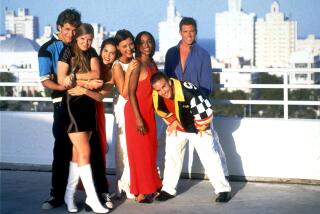1987 Was Learning Experience for Boris Becker
- Share via
MONTE CARLO — Boris Becker, just shy of turning 20, waxed philosophical on 1987.
“You can’t make a good year out of a miserable one,” he said at his home here. “I had as many experiences in one year as in my three previous years as a professional.”
Bad experiences, above all. For example losing the Wimbledon title, which he held in 1985 and 1986. Becker admits “it hurts . . . it’s painful” recalling his elimination from the prestigious tournament.
Still Becker, who turns 20 on November 22, thinks that 1987 has been an important year for learning some lessons.
“Now I know what it means to be on top, and how hard it is to stay there and everything that has to be done to become No. 1, including off the court,” Becker says. “At the end of this year I am ranked fourth in the world. Many say this is a plunge. I don’t know whether a No. 4 ranking can be called a plunge.”
Becker says that the ambition is still there, to regain the top ranking, though.
“I have a chance at it, and this remains my goal,” he said. He recalled that last February, when he won a Grand Prix tournament--one of his three victories this year--at Indian Wells, Calif., he had played “as well as never before . . . For the first time I felt that I really had a chance to become the world’s best tennis player.”
Looking at how his game developed, Becker said that hard training had improved “by 100%” his baseline strokes, his leg work, and his physical condition. But then his service, previously feared by opponents for its power, suffered.
Becker also looks back on 1987 as one long series of injuries and illnesses. A thyroid gland infection in February weakened him for months afterward.
In May, before bowing to Mats Wilander in the semifinals of the French Open in Paris, Becker was bedridden with a 102-degree fever.
Then came the marathon Davis Cup elimination-round matches in Hartford, Conn., in July, when Becker led the West German Davis Cup team past the United States. Those matches produced ligament injuries in his serving arm and his legs, and since then he has not had a chance to properly heal.
“I had never before been so ill. Then came the many injuries. The one follows the other,” Becker said.
He also admits that his separation from his coach, Guenther Bosch, at the Australian Open in Melbourne last January had been a reason that 1987 was not as successful as he had hoped.
“Things went from bad to worse. Suddenly, I was the bad guy,” Becker said. “It was like they were throwing stones at me. I wasn’t used to this . . . it was all so new for me.”
Becker hopes to hire a new coach, the three prime candidates being former U.S. tennis pro Marty Riessen, 45, or two Australians, Bob Brett, 38, or Fred Stolle, 45. The choice will largely depend on which of the three can get out of his current professional obligations.
Looking to 1988, Becker says that his primary aim is Wimbledon, and the 1988 Olympic Games in Seoul, South Korea.
“I want to experience that completely,” Becker says about the Olympics. “I would like to be there for the Opening Ceremony, and if they can’t find anybody better to do it, I’d like to carry the German flag into the stadium. . . . The Olympics--that is something unique.”
Becker also admits that 1987 has been a year when “I did not always have the right attitude.” Last summer, he “ . . . began looking for excuses.”
Amid all the setbacks, Becker said life got lonelier. “It was a damned lonely job,” he said. He added that his girlfriend Benedicte, a few years older than he, had become all the more important to him, as were his closer ties to his parents.
More to Read
Go beyond the scoreboard
Get the latest on L.A.'s teams in the daily Sports Report newsletter.
You may occasionally receive promotional content from the Los Angeles Times.










